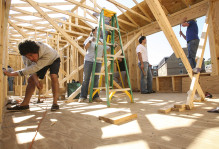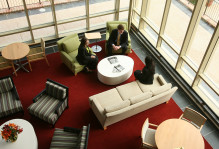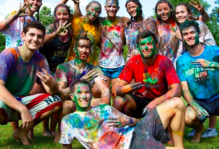Alternative Breaks…
This past Sunday I just got back from the ABCs, or Alternative Break Citizenship School in the Grand Canyon National Park, AZ. This week-long conference is organized by BreakAway, a national nonprofit organization dedicated to coordinating and providing resources for colleges and universities that send out alternative break service trips. They have three ABC sessions each summer, and I was fortunate enough to take part in the program that was hosted by Grand Canyon National Park. For a week we were housed, had workshops, and did service projects in the national park, learning about the various conservation and sustainability movements in the park to protect one of our world’s natural wonders and some of the rarest animal and plant species in the world.
I left Norfolk International Airport at 5:30 AM to fly out to Phoenix, AZ where I would meet Wesley Ng (my codirector for Branch-Out International Service trips), Katherine Eklund, Samanthe Tiver (the two directors for Branch-Out National service trips), and Melody Porter, W&M’s lovely Assistant Director in the Office of Community Engagement and Scholarship (OCES), and subsequently the director of the entire Branch-Out program.
Just to preface, Branch-Out is our alternative break and trip program, it is divided up into thee sections: Branch-Out Regional is our arm of the organization that does day and weekend service projects and trips to regional locations near Williamsburg, Branch-Out National (BON) is our domestic alternative Spring Break program. BON sends out ten trips every Spring Break to various locations within one driving day of Williamsburg to work with a certain issue area in that host site location. They are led by two student leaders and consist of about 10 students. Branch-Out International (BOI) coordinates the eleven or so international alternative breaks that take place over Winter, Spring and Summer breaks. My job is to help train the trip leaders, coordinate fundraising attempts and basically get everyone pumped about doing international service.
So… back to the topic at hand, BreakAway was an amazing experience. The whole point of the ABCs is for representatives from colleges and universities, with both old and new alternative break programs, to come out and share and learn new ideas of how to best spread the alternative break movement. So as not to confuse everyone, the alternative break “movement” is a growing trend in colleges and universities to send groups of students out into the community, both locally, nationally and internationally, to do volunteer work/ community service but to really get the students thinking about issues like social justice and environmental stewardship within their own community. The breaks are “alternative” to the “typical” breaks that college kids our age usually take – you know, the ones to Cancun to go on booze cruises and spend the week full of partying and generally being destructive and unproductive citizens.
Sorry… got sidetracked again, but basically the idea behind alternative breaks is not only to send students on a substance-free trip to some other part of the country or exotic locale, but to bring the experiences back to our local community and tackle social issues here. The trips have eight basic components integrated into them: Strong direct service, orientation, education, training, reflection, reorientation, diversity and being alcohol and drug free. During the week, all sixty of us from over 33 different universities went through these eight components and discussed/ learned how to best integrate these into our programs and make them as strong as possible.
1.) Strong direct service is obviously important in a service trip. Our goal is to find host sites that allow us to do pertinent service projects that relates to the issue that we’re trying to tackle and that’s appropriate for the size of the group. For example, in the Grand Canyon our primary service project was to pick up trash along the trails – while this may sound tedious, it was extremely important, as it not only relieves the duties of the full time rangers that would usually be performing such tasks, but the consumption of litter and other trash is a primary cause of the endangerment of one of the rarest birds in the world, the giant California Condor.
2.) Education, Orientation and Training are extremely important facets to any strong break program. Education about the specific issue within its context (say… sustainable low-income housing) helps give the student a perspective on the service they’re doing and access to general knowledge on the issue both at home and abroad. Orientation introduces the participant to the specific host site organization and how operations in our specific host site go as opposed to a more broad-based view of the issue that you cover in Education. Orientation allows the participant to have a good grasp of the organization and the location-specific task on hand. Lastly, training in hard skills (such as how to properly swing a hammer or mix concrete) and soft skills (like local vocabulary or contextual phrases) are hugely important to the group so that you can get to the site and start work almost immediately.
3.) Reflection is probably one of the most important and yet most over-looked aspect of any alternative break. It allows participants to think back on what occurred during the day and connect it to the education that they had beforehand and to connect it back to their communities back home. Strong reflections allow a continual learning process and kind of an ‘eye-opening’ experience for many participants, getting them to see the bigger picture and how their actions fit into their roles as active citizens.
4.) Reorientation is also hugely important. In my experience a group will have an amazing time during the trip, reflect well and be prepared to come back to campus jazzed up and ready to ‘change the world.’ However, without proper reorientation, all this energy is for naught, where participants will come back and fall back into their routines. Reorientation allows the student to further the connections between the issues they worked with during their trip and their local communities, and also to provide an outlet for what I call the “post-alternative break funk.” It can help raise awareness for certain issues and engage the student once they get back.
5.) Diversity is also a crucial aspect to any trip – not only racial and ethnic diversity, but also diversity of political thought, religious affiliation, background, etc. The more diverse a trip is, the wider the span of perspectives that are brought to the group. This allows for greater facilitation of constructive discussion and reflection during and after the trip, and in the long run will give everyone who participates a much greater perspective on the issue and a greater appreciation for the work they did.
6.) Lastly – having the trips be drug and alcohol free truly makes the trip “alternative.” Being substance free does away with issues of liability and safety while at a host site, dissuades worries about respecting the local community, and also increases group cohesion and bonding when issues about alcohol and drug use (which are pretty divisive issues) are tossed out the window.
So sorry to ramble on for so long, but throughout my week at the Grand Canyon, I met amazingly intelligent and thoughtful people who are a huge part of this movement at their respective schools. There was so much positive energy flowing around our conversations, and we also got to see some amazing sights as well. I thought about what I learned and what I/ we could bring back to W&M to make our alternative break programs that much stronger and joining such a great national movement towards active citizenship and community engagement.
Thanks for reading, and if you want more information on BreakAway and their philosophy, visit their website at: http://alternativebreaks.org
Adam




No comments.
Comments are currently closed. Comments are closed on all posts older than one year, and for those in our archive.